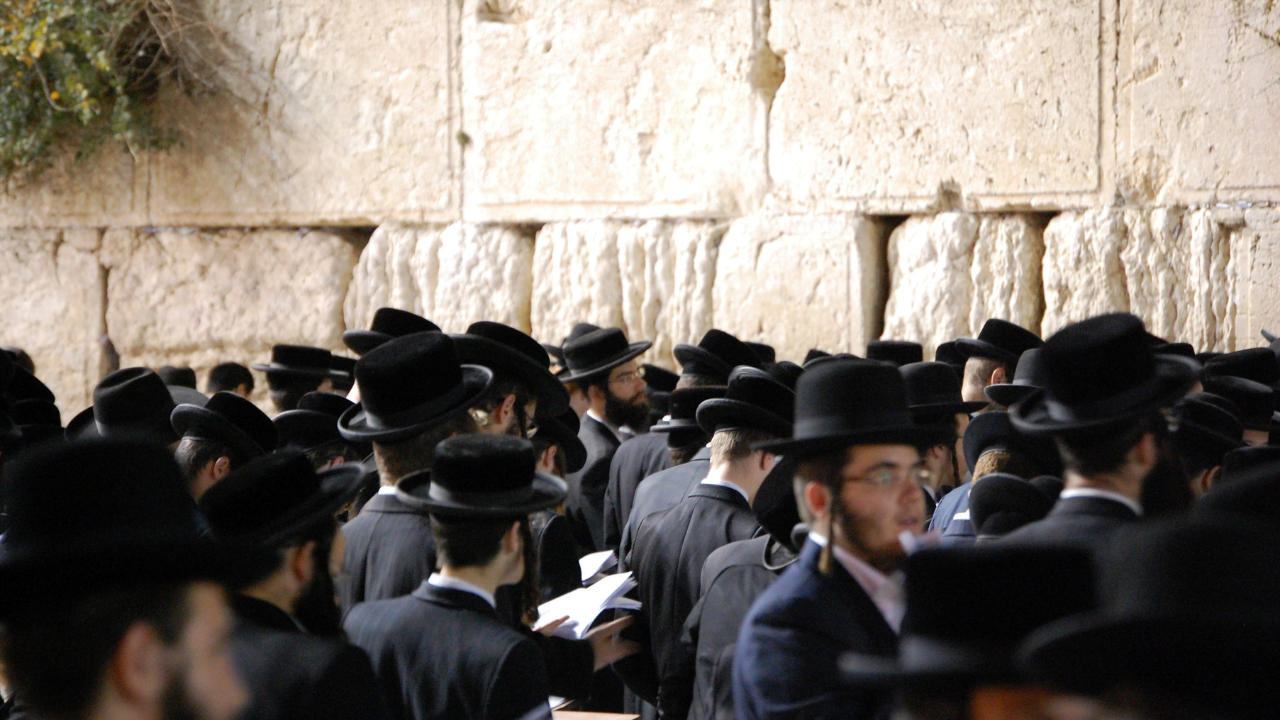No products in the cart.
Why Does Judaism Only Believe In One God
This post contains paid and/or affiliate links. I make a small commission at no extra cost to you. Please see our Privacy Policy.
Judaism, one of the world’s oldest religions, is known for its steadfast belief in the existence of only one God. The concept of monotheism forms the foundation of Jewish theology and distinguishes it from many other ancient religions that practiced polytheism.
Understanding why Judaism only believes in one God requires examining the historical development of Jewish monotheism, the role of influential figures like Moses, and the impact on Jewish theology and practices.
Judaism’s belief in one God, often called Yahweh, can be traced back to ancient times. Within the religious and cultural context of the ancient Near East, where polytheism was prevalent, the idea of a single, all-powerful deity was revolutionary. Jewish monotheism emerged as a response to the polytheistic beliefs surrounding the Israelite people.
The historical development of Jewish monotheism reveals a gradual shift from polytheistic tendencies to an unwavering belief in one God. At the heart of this transformation is the figure of Moses. According to Jewish tradition, Moses received the Ten Commandments from God on Mount Sinai, emphasizing the exclusivity of the Israelite’s devotion to God.
This pivotal event solidified the monotheistic belief within Judaism, setting it apart from the surrounding polytheistic cultures.
Comparing Jewish monotheism with the polytheistic beliefs of the ancient Near East provides further insight. Whereas polytheistic religions worshiped a pantheon of gods and goddesses, each with its sphere of influence, Judaism emphasizes God’s unity, transcendence, and omnipotence.
The belief in one God had profound implications for Jewish thought and practice, shaping the understanding of God’s nature and relationship with humanity.
Monotheism’s influence on Jewish theology and practices is evident in various aspects of Jewish religious life. The concept of ethical monotheism, which emphasizes the moral obligations and responsibilities of individuals towards God and fellow human beings, is central to Jewish teachings. This includes adherence to the Ten Commandments, which prescribe guidelines for ethical living.
Furthermore, monotheism is intrinsically connected to Jewish worship practices. The Shema, a central Jewish prayer recited daily, declares the belief in the oneness of God. Jewish worship focuses on praising and connecting with this divine being without intermediaries or idols.
Judaism’s belief in one God reflects its commitment to monotheism, distinguishing it from the ancient Near East polytheistic traditions. The historical development of Jewish monotheism, led by Moses, solidified the belief and shaped Jewish theology and practices. Understanding the concept of monotheism in Judaism provides valuable insights into the foundations of this ancient religion.
The Historical Development of Jewish Monotheism
The concept of monotheism, the belief in one God, is foundational in Judaism. This article explores the historical development of Jewish monotheism, shedding light on its origins and significance within the religion.
Judaism’s belief in one God sets it apart from many other ancient religions that embraced polytheism. In a world where polytheistic beliefs and practices were widespread, Judaism emerged as a unique monotheistic faith. The roots of Jewish monotheism can be traced back to the historical experiences of the ancient Israelites.
During the ancient Near East, the region where Judaism originated, polytheism was prevalent. Ancient civilizations worshipped multiple gods, attributing various powers and attributes to each deity. However, the ancient Israelites came to understand their God as the one and only, distinct from the pagan gods worshipped by their neighbors.
The historical figure of Moses played a significant role in establishing and solidifying monotheism within Judaism. According to Jewish tradition, Moses received divine revelation on Mount Sinai, where he encountered God uniquely and profoundly. This encounter became pivotal in Jewish history, as Moses received the Ten Commandments and instructions for the Israelites to worship only one God. This event is seen as a watershed moment in the development of Jewish monotheism.
The belief in one God profoundly impacted Jewish theology and practices. Monotheism formed the basis for the Israelites’ covenant with God, emphasizing the exclusive devotion and worship of the one true God. It influenced the development of Jewish religious texts, such as the Torah and the Hebrew Bible, which emphasize the unity and singularity of God.
Jewish monotheism also shaped various aspects of Jewish religious life. The worship practices in the ancient Temple in Jerusalem centered on the one God, with sacrifices and rituals dedicated solely to Him. The synagogue became another important institution for communal prayer, and the study of Jewish scriptures focused on worshipping the one God.
Moreover, the belief in one God in Judaism is not limited to theological aspects but also to ethical principles. The monotheistic belief emphasized the importance of morality, justice, and the responsibility of individuals towards one another.
The historical development of Jewish monotheism has been a fundamental aspect of Judaism since ancient times. The belief in one God distinguished Judaism from its polytheistic neighbors and profoundly impacted Jewish theology, practices, and ethics. Moses played a crucial role in establishing monotheism, which continues to shape Jewish identity and religious life today.
The Role of Monotheism in Judaism and Comparison with Polytheistic Beliefs in the Ancient Near East
Judaism is founded on the belief in the existence of a single, supreme God. This principle, known as monotheism, sets Judaism apart from the polytheistic beliefs prevalent in the ancient Near East. The concept of monotheism in Judaism has deep historical roots and has played a central role in shaping Jewish theology and practices.
In the ancient Near East, polytheism was the dominant religious belief system. Cultures such as the Egyptians, Babylonians, and Canaanites worshiped multiple gods, each representing different aspects of the natural world or specific human endeavors. These gods were often associated with natural elements like the sun, moon, rivers, and specific professions or domains.
However, Judaism emerged with a distinct monotheistic belief system. The Hebrew Bible, also known as the Tanakh, consistently emphasizes the existence of one God, the creator of the universe and the ultimate source of all existence. This monotheistic concept challenged the prevalent polytheistic beliefs of the time and set Judaism on a unique spiritual path.
The transition from polytheism to monotheism in Judaism is believed to have occurred gradually over many centuries. During the time of the biblical figure Moses, the belief in one God became central to Jewish identity. According to the Hebrew Bible, Moses received revelations and commandments from God, including the Ten Commandments, which explicitly state, “You shall have no other gods before me” (Exodus 20:3).
The role of Moses in establishing monotheism in Judaism cannot be overstated. He led the Israelites out of slavery in Egypt and forged a covenant between them and God at Mount Sinai. This covenant, known as the Mosaic Covenant, was accompanied by divine laws and regulations that guided the Israelites’ religious and ethical practices. This covenant firmly established the belief in one God as the foundation of the Jewish faith.
Monotheism has had a profound impact on Jewish theology and practices. It has emphasized the unity, omnipotence, and transcendence of God. The belief in one God has guided Jewish ethical principles, such as pursuing justice and compassion for all humanity. Monotheism also fostered a sense of collective identity among the Jewish people, as they believed God chose them to fulfill a unique role in the world.
Furthermore, the concept of monotheism in Judaism has stood the test of time, influencing other major world religions such as Christianity and Islam. Both religions trace their roots back to Judaism and share the belief in one God.
The monotheistic belief system in Judaism distinguishes it from the polytheistic beliefs in the ancient Near East. The role of Moses in establishing monotheism as the core principle of Judaism cannot be understated. Monotheism has profoundly impacted Jewish theology, guiding their ethical principles and fostering a sense of collective identity. Moreover, the concept of monotheism in Judaism has influenced other major world religions, leaving a lasting legacy.
The Role of Moses in Establishing Monotheism in Judaism
One of the most significant figures in Jewish history, Moses was pivotal in establishing monotheism in Judaism. As the leader of the Israelites during their liberation from slavery in Egypt, Moses was instrumental in introducing the concept of one God to his people. This shift from polytheistic beliefs to monotheism laid the foundation for the core tenets of Judaism.
According to biblical accounts, Moses received divine revelations from God on Mount Sinai, including the Ten Commandments. These commandments explicitly state, “You shall have no other gods before me,” reaffirming the singular nature of God’s existence and demanding exclusive devotion. Under Moses’ guidance, the Israelites embraced this monotheistic belief and renounced their previous worship of numerous deities.
Moses’ role as a prophet and mediator between God and the Israelites further solidified the monotheistic framework of Judaism. Through his actions and teachings, Moses emphasized the importance of a personal relationship with God, encouraging adherence to His commandments and teachings.
In addition to his spiritual leadership, Moses established laws and rituals that enforced monotheism within the Jewish community. The Torah, which is believed to have been revealed to Moses by God, serves as the central text of Judaism and emphasizes the oneness of God. It contains the laws, rituals, and ethical teachings that guide Jewish life and strengthen the connection between the Jewish people and their faith.
Moses’ influence extended beyond his immediate followers, as his teachings and writings became the cornerstone of Jewish religious practice. Through example and instruction, he shaped future generations’ beliefs, traditions, and moral values, ensuring the enduring legacy of Judaism’s monotheistic foundation.
The impact of Moses’ role in establishing monotheism resonates throughout Jewish theology and practices to this day. Belief in one God remains a fundamental tenet of Judaism, shaping every aspect of Jewish life, including prayer, worship, ethical behavior, and the study of sacred texts.
Moses played a pivotal role in the historical development of monotheism in Judaism. His leadership, teachings, and revelation from God laid the groundwork for believing in one God as a central pillar of the Jewish faith. Today, Moses continues to be revered as a prophet and a guiding figure whose legacy upholds the monotheistic principles that define Judaism.
The Impact of Monotheism on Jewish Theology and Practices
Jewish Monotheism: A Profound Influence on Beliefs and Rituals
Monotheism, the belief in one God, stands as the foundational principle of Judaism. This concept profoundly impacts Jewish theology and practices, shaping the faith in various significant ways. By examining the nature of monotheism and its role within Judaism, we gain a deeper understanding of its influence on Jewish religious life.
Holiness and Unity in Jewish Theology
Central to Judaism is the belief that God is one and indivisible. This notion sets Judaism apart from polytheistic religions prevalent in the ancient Near East. The affirmation of monotheism emphasizes God’s absolute uniqueness and transcendence in Jewish thought. The One God, often referred to as Yahweh, is seen as the creator of the universe, the source of all life, and the provider of moral guidance.
Implications for Jewish Rituals
The belief in one God is crucial in shaping Jewish rituals and observances. Monotheism prompts Jews to engage in prayer, which serves as a means of connecting with the divine. Through prayer, Jewish individuals express their devotion, seek guidance, and offer gratitude to the solitary God. The recitation of prayers, such as the Shema, emphasizes the exclusive worship of the one true God.
Monotheism and Ethical Responsibility
Monotheism in Judaism also has a significant ethical dimension. Belief in a singular deity fosters a profound responsibility towards one another and the world. Jewish ethical teachings emphasize the importance of justice, compassion, and righteousness in human conduct. The belief in the existence of one God highlights the universal nature of these values and the obligation to uphold them.
Monotheism’s Impact on Jewish Identity
The concept of monotheism contributes to the formation of Jewish identity. It unifies the Jewish people under a shared belief system, fostering a strong sense of collective belonging. The belief in one God shapes Jewish history, literature, and customs, serving as a worldwide unifying force for the Jewish community.
Impact on Interfaith Relations
Monotheism’s influence extends beyond Jewish theology and practices, affecting interfaith relations. As Jews believe in one God, they share a common monotheistic foundation with Christianity and Islam. This common ground forms the basis for constructive dialogue and understanding between these Abrahamic faiths, promoting religious tolerance and cooperation.
The impact of monotheism on Jewish theology and practices is profound. It shapes Jewish beliefs, rituals, ethical teachings, and communal identity. The affirmation of one God sets Judaism apart from polytheistic traditions and fosters a sense of moral responsibility. Moreover, monotheism bridges interfaith dialogue and promotes harmony among different religious communities. Through the lens of monotheism, Judaism continues to evolve and inspire generations of faithful adherents.
Conclusion
The concept of monotheism lies at the very core of Judaism. With a rich historical development that traces its roots to the ancient Near East, the belief in one God distinguishes Judaism from the polytheistic practices of surrounding cultures. The role of Moses in establishing monotheism cannot be overstated, as he was instrumental in communicating God’s message and leading the Israelites out of bondage. This pivotal moment in Jewish history solidified their commitment to monotheism and shaped their theology and practices.
Judaism’s belief in one God differentiates it from the polytheistic beliefs in the ancient Near East. While neighboring societies worshipped many deities, Judaism embraced the idea of a single, all-powerful Creator. This monotheistic foundation fostered a unique relationship between the Israelites and their God, as they viewed themselves as a chosen people with a special covenant.
Historically, the development of Jewish monotheism can be traced back to the time of Abraham. The stories of the patriarchs and matriarchs and their encounters with God laid the groundwork for the monotheistic beliefs that would define Judaism. Over time, as the Israelites journeyed through the wilderness and settled in the Promised Land, their understanding of God deepened and evolved.
The pivotal figure of Moses played a crucial role in solidifying the belief in one God within the Jewish community. Through his encounter with God at Mount Sinai, Moses received the Ten Commandments and other laws that symbolized a covenant between God and the Israelites. These commandments emphasized the exclusive worship of Yahweh and rejected the worship of other gods, creating a clear separation from polytheistic practices.
This commitment to monotheism profoundly impacted Jewish theology and practices. It led to the development of a robust system of ethical and moral values, with the belief that all individuals were created in the image of God. The belief in one God also shaped Jewish worship, emphasizing prayer, study, and adherence to commandments to connect with the divine.
Throughout history, the Jewish people faced hardships and challenges that tested their faith in monotheism. Despite persecution and exile, the belief in one God remained the defining characteristic of Judaism. Today, Jews worldwide continue to uphold the principles of monotheism, finding strength and guidance in their relationship with God.
The concept of monotheism is fundamental to Judaism. Its historical development, rooted in ancient Near Eastern beliefs, was solidified through the leadership of Moses and remained a cornerstone of Jewish theology and practices. The belief in one God sets Judaism apart from polytheistic cultures and has shaped the identity and values of the Jewish people throughout their rich history.













